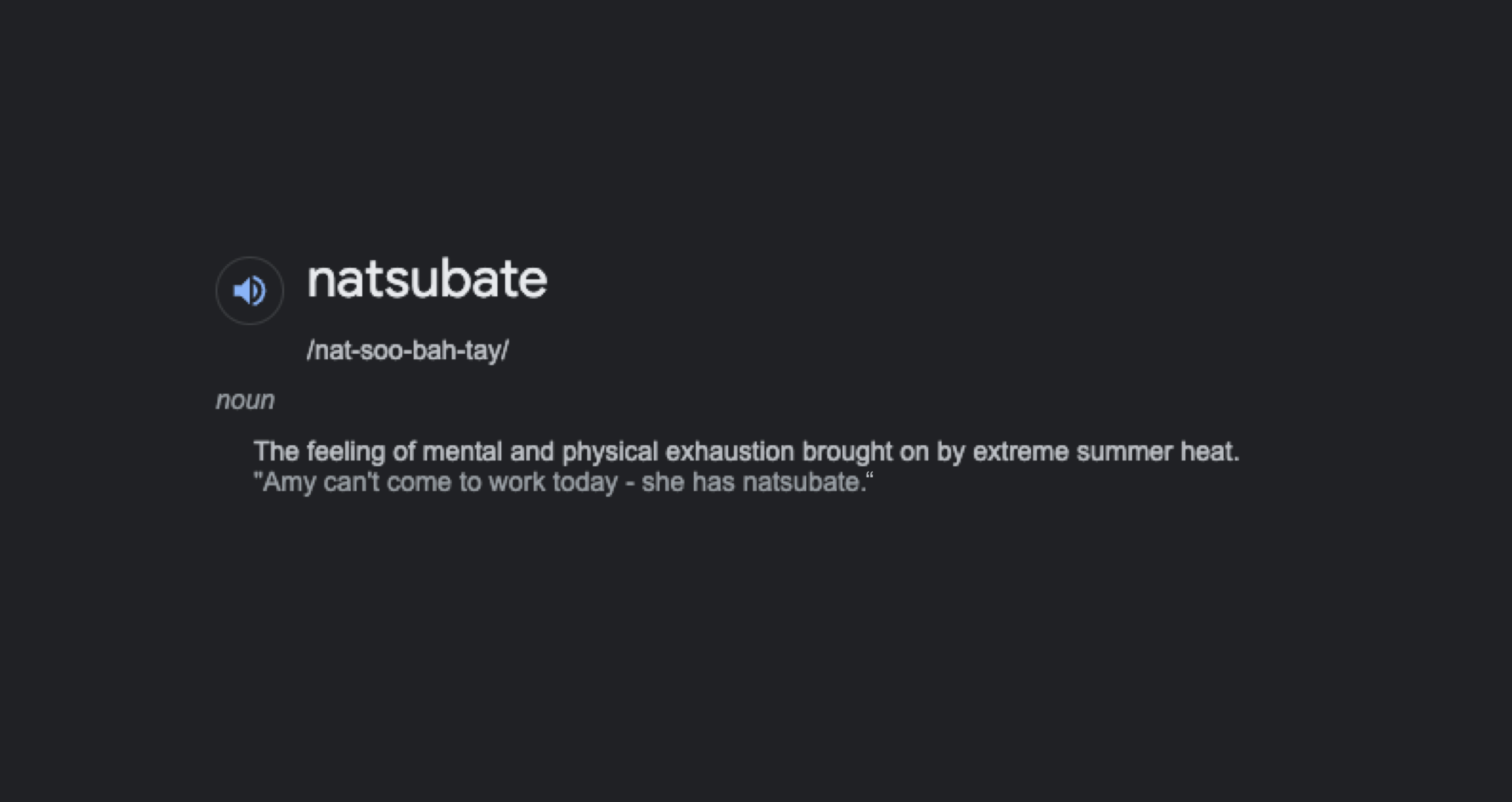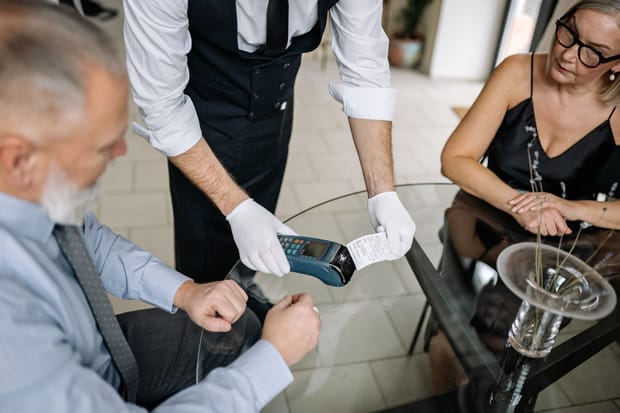English borrows a lot of words from other languages — and we use them all the time without thinking.
We’ve inherited “gurus” from Sanskrit; “entrepreneurs” from France; “wanderlust” from German, and fans of all things Scandi will find it hard to forget about “hygge”, the Danish word for "cosiness and conviviality" whose usage soared in 2018.
Today, we’d like to add another word to that list — one that, sadly, isn’t nearly as inspiring or cosy, but is one that we’re betting we’ll be hearing a lot more in the coming years.
Introducing: “natsubate”, the uniquely Japanese expression for summer fatigue...
What is "natsubate"?
Natsubate (pronounced “nat-soo-bah-tay“) is a combination of two Japanese words: natsu, meaning summer, and bate, meaning exhaustion.
You’ll hear this word all over Japan at this time of year — in schools, at work, even at home — and is often associated with feelings of tiredness, lethargy, and even physical illness as a result of extreme summer heat.
This is because, although their seasons line up with ours, Japan’s summers are extremely hot. Even with summer yet to get into full swing this year, temperatures in Japan’s capital hovered around the 35°C mark for most of June 2022, at one point even hitting 40.2°C.
Little wonder that they should have a word specifically for describing the feeling of mental and physical exhaustion caused by weeks of heatwaves.
As the Earth continues to heat up, it’s an inevitably sad fact that this kind of “summer fatigue” will become more and more common in other countries — including the UK — and that business owners will need to take steps to ensure that their staff stay healthy and comfortable in the heat.

What are the dangers of working in extreme heat?
Often referred to as “heat stress”, working in the summer heat can severely affect the health of your employees.
The Health and Safety Executive (HSE) warns that, while some individuals are more susceptible to heat stress than others, common symptoms of heat stress include:
- Fainting
- Muscle cramps
- Heat rashes
- An inability to concentrate
- Heat exhaustion (headaches, nausea, tiredness etc.)
- Heat stroke (hot, dry skin; feelings of confusions, and even losing consciousness)
It’s not only staff who work outside in the sun who can fall ill as a result of heat stress — employees working in places like kitchens, factories, busy pubs and bars, or even out on the road such as domiciliary care workers are all at risk.
Do employers have to send staff home if it’s too hot?
There’s currently no legal “maximum temperature” for workplaces in the UK — probably because, apart from a handful of summers, it rarely gets so hot that people are in danger of falling ill.
But if things keep going the way they are that could change, and with the words “hottest day on record” appearing in headlines with worrying frequency over the past few years, legislation may soon have to catch up.
Employers are advised by the HSE to ensure that their staff work only in environments where the temperature is “reasonable”. As we know from decades of thermostat wars both in and out of the office, however, one person’s “warm” is another person’s “sweltering”, so this can be difficult to judge.
Right now, your best bet is to take steps early to keep your staff happy and healthy in the workplace…
Quick tips for keeping staff cool & comfortable during summer
The average temperature of your workplace will depend on what your staff do and the services you offer, but there are a number of things you can do to help keep your employees comfortable and prevent natsubate.
- Keep your team hydrated
- Maintain a comfortable temperature
- Make sure staff recognise the signs of dehydration
- Keep an eye on the thermostat
- Provide shade for outdoor workers
- Provide high-SPF sunscreen for outdoor staff
Keep your team hydrated. In addition to making your staff aware of the dangers of dehydration, consider setting up hydration stations where they can quickly and easily access water (and isotonic sports drinks if you have them) throughout the day — not just on their breaks.
Maintain a comfortable temperature. Either through use of air conditioning (more on this below) or good ventilation (which is also important for keeping Covid at bay), try to keep the airflow in your workplace constant and the temperature somewhere in the region of 20–23.5°C.
Make sure staff recognise the signs of dehydration. In addition to your managers and first-aiders, your wider team should be able to identify the signs of heat exhaustion and be encouraged to quickly respond if they or someone else starts to feel ill.
Keep an eye on the thermostat. Air conditioning can be an absolute blessing during summer, but it’s thought that natsubate is often made worse by constantly moving between hot and cold (e.g. air-conditioned) environments. Remember: the goal with air conditioning is to make the room comfortable rather than cold.
Provide shade for outdoor workers. If your staff work or take their breaks outdoors, invest in some artificial shade so that they’re not exposed to the heat of the sun for longer than necessary.
Provide high-SPF sunscreen for outdoor staff. Sunburn is no laughing matter, and prolonged exposure to strong UV rays can easily cause sunstroke and worse, so consider providing a quality, high-SPF (at least factor 30) sun lotion for staff whose roles involve time outdoors. (Just be sure to check whether any of your team have any allergies or skin sensitivities first.)
Wrap-up
It might be the polar opposite of hygge, but as the UK is further affected by extreme summer heat, natsubate could become a widely recognised word.
Understanding the signs of heat stress, and the impact it has on the human body, is now an important part of managing a team during the summer, and vital to ensuring the health and wellbeing of staff.
Keeping your team hydrated and ensuring a safe working environment are two things managers and owners can do to provide respite during a heatwave, but be sure to talk to your team as well. After all, no one is better placed to tell you what they need than those doing the work.
Plus, there’s nothing that we Brits enjoy more than talking about the weather!





